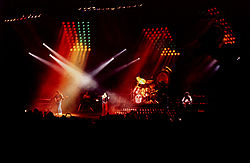- Arena rock
-
 A Queen concert in Drammen, Norway in 1982, showing the scale and lighting of an arena rock concert
A Queen concert in Drammen, Norway in 1982, showing the scale and lighting of an arena rock concert
Arena rock (sometimes stadium rock,[1] anthem rock,[2] or corporate rock[3]) is a term used to describe rock music that utilised large arena venues, particularly sports venues, for concerts or series of concerts linked in tours. Musically, arena rock bands often came from the hard rock, heavy metal and progressive rock genres, but utilised a more commercially oriented and radio-friendly sound, with highly-produced music that included both hard rock numbers and power ballads, both often employing anthemic choruses.[4]
History
The origins of arena rock were in the 1960s, sometimes dated to when The Beatles played Shea Stadium in New York in 1965. Also important was the success of the large pop and rock festivals like Monterey (1967) and Woodstock (1969)[5] and the use of large stadiums for American tours by bands including The Rolling Stones, Grand Funk Railroad and Led Zeppelin. The tendency developed in the mid-1970s as the increased power of amplification and sound systems allowed the use of larger and larger venues.[1] Smoke, fireworks and sophisticated lighting shows became staples of arena rock performances.[6] It has been argued that the rise of arena rock marked the end of the idealism of 1960s, particularly in the disillusionment that followed the Altamont Festival of 1969, for a more commercial form of rock.[1] Key acts included Journey, REO Speedwagon, Boston, Foreigner, Styx,[4] Kiss, Peter Frampton[7] and Queen.[8][9]
The use of commercial sponsorship for the large-scale tours and concerts of this era began to lead to the music being branded, usually pejoratively, as corporate rock.[10] The commercialism, and "overblown" spectacle of stadium rock has been seen as promoting a number of reactions, including the pub rock[11] and punk rock movements in the 1970s.[12] In the 1980s arena rock became dominated by glam metal bands, following the lead of Aerosmith[13] and including Mötley Crüe, Quiet Riot, W.A.S.P. and Ratt. Their popularity was challenged by the rise of indie and alternative rock bands who began to breakthrough to the mainstream, particularly after the success of Nirvana, from the early 1990s.[14]
See also
Notes
- ^ a b c S. Waksman, This Ain't the Summer of Love: Conflict and Crossover in Heavy Metal and Punk (University of California Press, 2009), ISBN 0520253108, pp. 21-31.
- ^ G. Donaldson, The Making of Modern America: the Nation from 1945 to the Present (Rowman and Littlefield, 2009), ISBN 0742548201, p. 248.
- ^ L. M. Scrivani-Tidd, The Greenwood Encyclopedia of Rock History: From Arenas to the Underground, 1974-1980 (Greenwood Press, 2006), ISBN 0313329370, p. 74.
- ^ a b “Arena rock”, Allmusic, retrieved 20 January 2011.
- ^ E. Weisbard, This is Pop: in Search of the Elusive at Experience Music Project (Harvard University Press, 2004), ISBN 0674013212, p. 62.
- ^ R. Shuker, Popular Music: the Key Concepts (London: Routledge, 2nd., edn., 2002), 0415284252, p. 158.
- ^ J. Shepherd, ed., Continuum Encyclopedia of Popular Music of the World, Volume 1 (Continuum, 2003), ISBN 0826463215, p. 423.
- ^ P. Buckley, The Rough Guide to Rock (London: Rough Guides, 3rd edn., 2003), ISBN 1843531054, p. 835.
- ^ Thrills, Adrian (11th March 2011) We STILL rock you: Re-releases chart Queen's rise to power Daily Mail. Retrieved June 16, 2011
- ^ W. M. Reynolds and J. A. Webber, Expanding Curriculum Theory: Dis/positions and Lines of Flight (London: Routledge, 2004), ISBN 0805846646, p. 24.
- ^ A. Bennett, “Even better than the real thing? Understanding the tribute band phenomenon”, S. Homan, ed., Access All Eras: Tribute Bands and Global Pop Culture, (Hill International, 2006), ISBN 0335216900, p. 26.
- ^ P. Browne and R. B. Browne, The Guide to United States popular culture, (Popular Press, 2001), ISBN 0879728213, p. 31.
- ^ D. L. Joyner, American Popular Music (McGraw-Hill, 3rd edn., 2008), ISBN 0073526576, p. 261.
- ^ "Hair metal", Allmusic. Retrieved 6 July 2010.
Pop rock Arena rock · Baroque pop · Dream pop · Emo · Glam metal · Glam punk · Glam rock · Manila Sound · Pop punk · Power pop · Soft rock · Sunshine popRock music Alternative rock · Anatolian rock · Arena rock · Art rock · Baroque pop · Beat music · Blues rock · Cello rock · Chicano rock · Christian rock · Comedy rock · Country rock · Dance-rock · Electronic rock · Folk rock · Funk rock · Garage rock · Glam rock · Hard rock · Heartland rock · Heavy metal · Indie rock · Instrumental rock · Jam · Jazz rock · Krautrock · Latin rock · Ostrock · Pop rock · Power pop · Progressive rock · Psychedelic rock · Pub rock (UK) · Pub rock (Australia) · Punk rock · Rap rock · Rockabilly · Rock and roll · Roots rock · Samba rock · Soft rock · Southern rock · Space rock · Sufi rock · Surf music · Symphonic rock ·Radio formats: Other topics: Categories:
Wikimedia Foundation. 2010.
